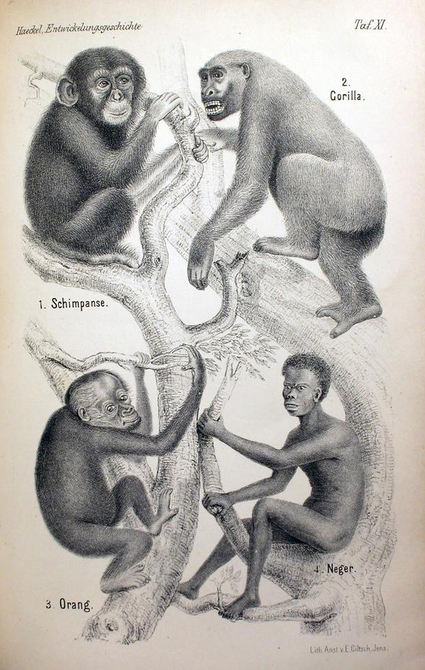The answer is fairly simple – yes!
Haeckel believed in the hierarchical order of human races – the Caucasian race (including indo-Germans and Semites) being the most highly developed one. He believed that the less developed races were actually closer to ape-ancestors than to Caucasians. This view explains the position of the ‘Neger’ in the drawing. We can conclude that Haeckel was a racist.
Yet, Haeckel was in ‘good’ company. Racism was a well-established outlook during the eighteenth and nineteenth century. Many of his predecessors, as for example famous biologist Carl Linneaus (1707-1778) and many of his contemporaries believed in racial hierarchies. Including Charles Darwin himself. During the eighteenth and nineteenth century, biologists took racial differences for granted. Most of them believed in the hierarchical distinction between more and less developed races. As biologists, their job was to study the differences in races from a scientific perspective.
It is however flawed to assume that the belief in racial hierarchies automatically lead biologists as Haeckel to accept what we would refer to as ‘racist’ behavior. Both Darwin and Haeckel seemingly did not subscribe to a view that would call for the dehumanizing treatment of lower ‘races’. Darwin travelled many parts of the world on his Beagle Voyage. When he visited the slave countries in South America, he was appalled by what he saw and became a fierce abolitionist. The study of Haeckel’s travel notes has shown that Haeckel searched for the contact with what he considered the ‘lower races’, even more so than with his fellow Europeans. This contact was one of friendly curiosity, not animosity.
So, to conclude, we can confirm that Haeckel was a racist. But we should be careful to too easily subsume nineteenth century racism under our contemporary understanding of racist behavior. And it is simply flawed to single out Haeckel as a racist among his allegedly non-racist contemporaries.
